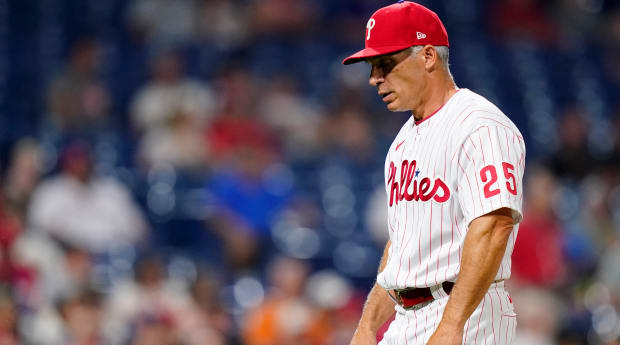The Phillies always were a faux contender. By payroll alone, they fooled some people into thinking otherwise. Only the Mets, Dodgers and Yankees spent more than Philadelphia’s $233 million. But it was going to be difficult for the Phillies to push 90 wins with poor defense and a questionable bullpen. Joe Girardi paid the price for those flaws. But he also added to them.
The Phillies fired Girardi as manager Friday after a 273-game tenure that can only be classified as a failure. Girardi was 132–141 with Philadelphia while presiding over the worst bullpen in baseball (5.00 ERA) other than the Rockies (5.38 ERA). Girardi’s relievers somehow gave up the fourth-most homers and suffered the fifth-most losses in three seasons despite throwing the fourth-fewest innings.

AP Photo/Matt Slocum
Unofficially, Girardi was gone May 24. That was the night in Atlanta when Girardi refused to use his closer, Corey Knebel, after a two-run homer in the top of the ninth by Bryce Harper gave the Phillies a 5–4 lead. A win would have pulled the Phillies to within one game of .500. Girardi asked Nick Nelson to do something he had never done before: Close a one-run ball game. Ten pitches later, the Phillies lost. And Girardi lost the clubhouse. It started a 1–7 tailspin that sealed his fate.
Why didn’t Girardi use his closer that night? He has a “rule” that no reliever should pitch three consecutive days, especially early in the season. Defending himself, Girardi brought up junk science. “Look how many guys had Tommy John surgery last year,” he said.
He told Knebel, who wanted the ball, “You threw a lot of pitches” on each of the previous two days. His pitch counts: 23 and nine.
Protecting the health of players is admirable. But you cannot be so rigid as to disallow common sense, especially when your position players have fought back to the edge of a needed victory.
The greatest relief pitcher of all time, Mariano Rivera, pitched 19 years without a major arm injury. Do you know how many times he pitched three days in a row? Forty-six times. He did so 39 times for Joe Torre and seven times for Girardi.
The Phillies’ bullpen would test any manager, but Girardi does not have a good track record of running bullpens. His bullpens ranked in the bottom half more times (eight) than in the top half (six). In his eight years without Rivera, Girardi’s bullpen ranks were 3, 14, 16, 19, 21, 24, 25, 30.
In addition to his bullpen usage, Girardi took heat for his lineups, a popular criticism that tends to be overrated by critics. Even so, Girardi’s leadoff hitters posted a .252 on-base percentage. Only two teams ever finished a season with a worse OBP out of the leadoff spot: the 1969 expansion Padres and the ’81 Blue Jays.
There was little Girardi could have done with the hand he was dealt on defense. The elbow injury to Harper forced bat-first free agents Kyle Schwarber and Nick Castellanos to get regular run in the corner outfield spots. The interior defense was so bad it allowed a .270 batting average on grounders—38 points worse than average and worse than every team except the Nationals.
Every year the Phillies have less acreage to cover in their home park than any other team, and every year they defend poorly. Under Girardi they ranked 30th, 23rd and 26th in defensive efficiency. In the three previous seasons they ranked 16th, 29th and 22nd. Girardi’s replacement, Rob Thomson, is not going to turn bad defenders into good ones.
Don’t let the luxury tax bracket fool you. From the start the Phillies were a flawed team. Trying to win without a reliable defense and bullpen is a losing formula. The offense (seventh in the league in runs per game) wasn’t close to covering such flaws. It was a difficult task, and Girardi had to go because he was not up to it.






